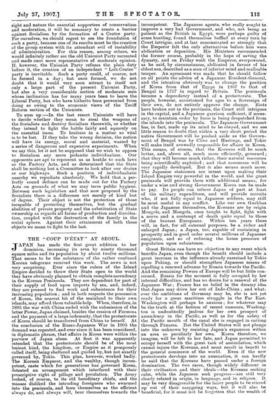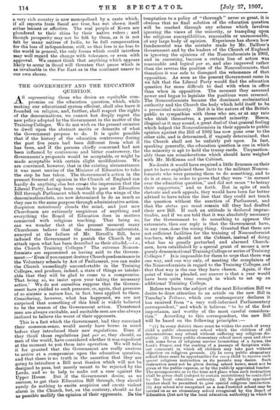THE "COUP D'ETAT " AT SEOUL.
JAPAIsT has made the first great addition to her dominion, increasing its area by ninety thousand square miles and its population by about twelve millions. That seems to be the substance of the rather confused Korean telegrams received this week. The news is not very surprising. Ever since the rulers of the Island Empire decided to throw their State open to the world they have obviously planned to obtain complete ascendency in the Korean Peninsula. They are dependent for part of their supply of food upon imports by sea, and, indeed, they are pressed to find work and subsistence for their increasing population ; and in both respects the possession of Korea, the nearest bit of the mainland to their own islands, may afford them valuable help. When, therefore, in 1895 the war with China ended with the submission of the latter Power, Japan claimed, besides the cession of Formosa and the payment of a large indemnity, that the protectorate of Korea should be transferred from China to herself. At the conclusion of the Russo-Japanese War in 1905 the demand was repeated, and ever since it has been considered, in diplomatic phrase, that affairs in Korea were within the purview of Japan alone. At first it was apparently intended that the protectorate should be of the most lenient kind, the kingdom, or Empire as it pompously called itself, being sheltered and guided by, but not exactly governed by, Tokio. This plan, however, worked badly. The Korean Emperor, and the wealthy, though incom- petent, caste which for generations has governed Korea, detested an arrangement which interfered with their prescriptive right of pillage and peculation. The Army looked, of course, to its old hereditary chiefs, and the masses disliked the intruding foreigners who swarmed into the peninsula, and bore themselves as the efficient always do, and always will, bear themselves towards the incompetent. The Japanese agents, who really sought to improve a very bad Government, and who, not being as patient as the British in Egypt, were perhaps guilty of some hustling, found themselves baffled at every turn by Court intrigue, and at last remonstrated so strongly that the Emperor felt the only alternatives before, him were abdication or deposition. His Ministers recommended the former course, probably in the hope of saving the dynasty, and on Friday week the Emperor, overpowered, as he said, by circumstances, abdicated in favour of his eldest son, described as a man of inferior mind and malleable temper. An agreement was made that he should follow. on all points the advice of a Japanese Resident-General, and the intention obviously was to change the position of Korea from that of Egypt in 1907 to that of Bengal in 1757 in regard to Britain. The peninsula became a dependency instead, of a protectorate. The people, however, accustomed for ages to a Sovereign of their own, do not entirely approve the change. Riots have broken out in the provinces, the Court still intrigues in the capital, and a Japanese garrison sufficient, if neces- sary, to maintain order by force is being despatched from the islands into the peninsula. The Japanese Government has, in fact, made up its mind to be obeyed, and we ,see little reason to doubt that within a very short period the native Government will be pushed aside as the Govern- ment of Bengal was by Clive and Hastings, and Tokio will make itself avowedly responsible for affairs in Korea. This means, of course, that the Koreans will be much better, and, above all, much more efficiently, governed;, that they will become much richer, their natural resources being scientifically exploited ; and that commerce will be very rapidly developed. But it also means much more. The Japanese statesmen are intent upon making their. Island Empire very powerful in the world, and the great peninsula will provide them with additional means, for under a wise and strong Government Korea can be made to pay. Its people can relieve Japan of part at least of the military expenditure, and will provide recruits who, if not fully equal to Japanese soldiers, may still be most useful in any conflict. Like our own Gurkhas and the Japanese themselves, the Koreans are by origin Mongols, and Mongols, once taught to fight, fight with a nerve and a contempt of death quite equal to those of the bravest Europeans. Within ten years there will, in fact, for all external purposes, be a richer and enlarged Japan ; a Japan, too, capable of sustaining in prosperity and in good order several millions of Japanese emigrants, and so of reducing the home pressure of population upon subsistence.
Great Britain can have no objection to any event which benefits Japan, even though the benefit should include a great increase in the influence already exercised by Tokio upon Peking, or should strengthen Japanese means of repelling a renewed advance by Russia, towards the Pacific. And the remaining Powers of Europe will be but little con- cerned. Russia for the moment is fully occupied by her internal difficulties, and has no desire for a renewal of the Japanese War; France has no belief in the dreamy idea that Japan may drive her out of Indo-China ; and what- ever the ambitions of Germany may be, she is not yet ready for a great maritime struggle in the Far East. Washington will perhaps be anxious ; for whatever may be the truth at the bottom of recent rumours, Washing- ton is undoubtedly jealous for her own prospect of ascendency in the Pacific, as well as for the safety of the Pacific mouth of the canal she is engaged in cutting through Panama. But the United States will not plunge into the unknown by resisting Japan's expansion within an area so peculiarly her own. Korea therefore, we imagine, will be left to her fate, and Japan permitted to occupy herself with the great task of assimilation, which cannot injure the Koreans, and must result in benefit to the general commerce of the world. Even if the new protectorate develops into an annexation, it can hardly be said that the Koreans have passed under a foreign domination. The two races, though widely different in their civilisation and their ideals—the Koreans seeking calm, while the Japanese seek progress—are still very closely related in origin, in language, and in religion. It may be very disagreeable for the lazier people to be stirred tup out of their easygoing ways, but it will also be beneficial, for it must not be forgotten that the wealth of a very rich country is now monopolised by a caste which, if all reports from Seoul are true, has not shown itself either lenient or effective. The real people of Korea are plundered to their skins by their native rulers ; and though prosperity may not be felt by them, as it is not felt by many natives of India, to be full compensation for the loss of independence, still, as that loss is no loss to the world in general, the only forces which could interfere may well regard the change with tolerance, or even with approval. We cannot think that anything which appears likely to occur in Seoul will threaten that peace which is as invaluable in the Far East as in the continent nearer to our own shores.







































 Previous page
Previous page